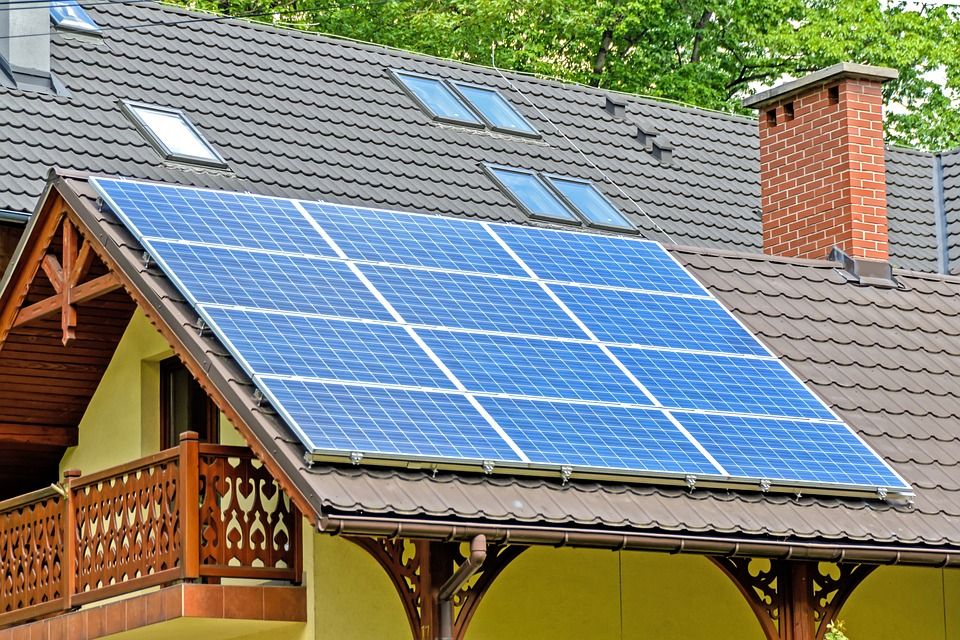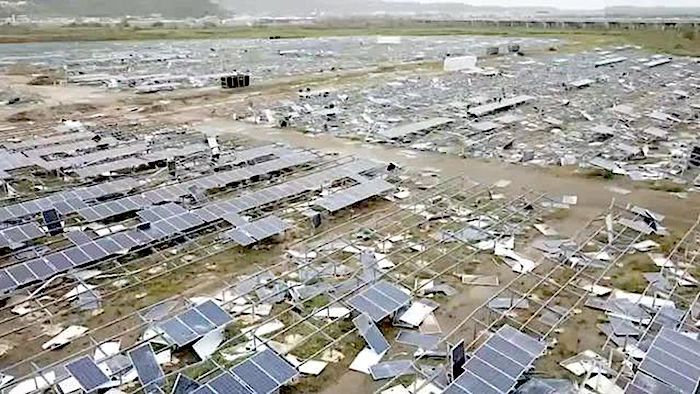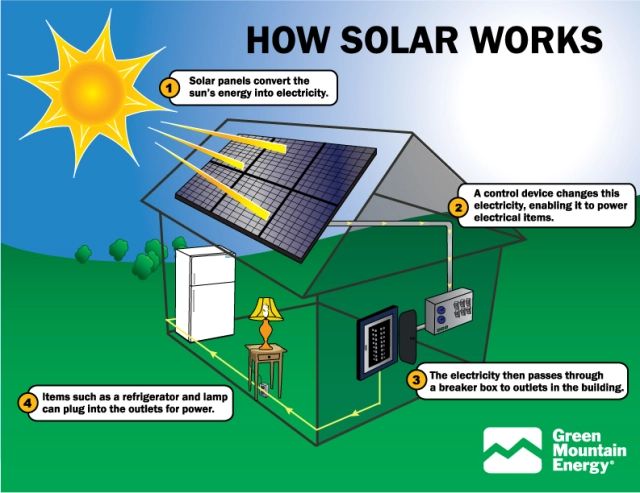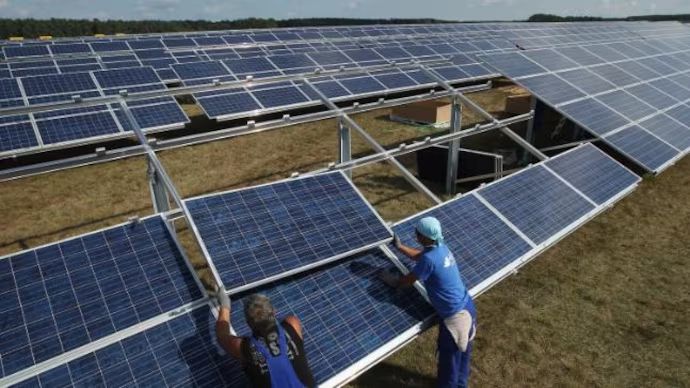How Much Does A Whole House Solar Generator Cost?

A whole house solar generator is an integrated system designed to provide backup power for an entire home during grid outages or for off-grid living. Whole house solar generators consist of solar panels, batteries for energy storage, and an inverter to convert DC power from the batteries into AC power for household use.
The key benefits of whole house solar generators include:
– Provide electricity 24/7, even during blackouts
– Reduce or eliminate electricity bills
– Work as an emergency power source during disasters
– Allow for clean, renewable solar energy use
– Increase energy independence and self-sufficiency
With the right components and proper sizing, whole house solar generators can provide reliable electricity for all household needs during grid failures. They offer homeowners peace of mind about power security and greater energy resilience.
Average Cost
The average cost for a whole house solar generator system in the U.S. ranges from $15,000 to $25,000 and up, according to Source. However, the final cost can vary significantly based on factors like the size of your home, energy usage, system components, installation complexity, location and more. Generally, larger homes with higher energy demands will require a more robust, and therefore more expensive, system.
According to Source, key factors that influence the overall system cost include:
- Number and size of solar panels needed
- Battery storage capacity
- Power of the inverter
- Additional hardware like racks and wiring
- Installation costs
- Permitting and inspection fees
- Geographic location
Being aware of these major cost factors can help homeowners budget and plan for a whole house solar generator system installation.
System Components
The main components needed for a whole house solar generator system are:
- Solar panels – These capture sunlight and convert it into electricity. The number and wattage of solar panels depends on your energy needs. For a typical home, you may need 15-20 panels that are 300W each (cite: https://blog.ecoflow.com/us/what-solar-generator-size-to-run-whole-house/)
- Battery storage – Lithium batteries store excess energy from the solar panels for use when the sun isn’t shining. For full home backup, you’ll likely need 20-30 kWh of usable battery capacity (cite: https://greencitizen.com/blog/can-a-solar-generator-power-a-house/)
- Inverter – Converts the DC power from the solar panels and batteries into standard AC power for your home’s outlets and appliances.
- Charge controller – Manages the charging and discharging of the batteries to optimize performance and lifespan.
- Racking and mounting – Securely mounts the solar panels and allows them to tilt toward the sun.
- Enclosure/housing – Protects batteries and electrical components from weather and impact.
- Cables and conduit – Safely connects all of the system components.
- Monitoring system – Allows you to track system performance and health.
Choosing the right size and capacity for each component is crucial for creating a solar generator that can reliably power an entire house during grid outages.
Solar Panel Costs
The cost of solar panels is typically measured in cost per watt. The average cost for residential solar panels in 2023 is around $2.50 to $3.50 per watt according to HomeGuide[1]. This can vary somewhat based on the type and efficiency of the solar panels.
For a whole home solar generator, the system size needed is usually between 5kW to 10kW to meet the energy needs of a typical home. At $3 per watt, a 7.5kW system would cost around $22,500 just for the solar panels. The number of solar panels needed depends on their wattage; for example, twenty 300W panels would produce 6kW.[2]
Some factors that affect solar panel pricing are the brand, efficiency rating, warranties, and supply/demand. High efficiency monocrystalline panels tend to cost more per watt than standard efficiency polycrystalline panels.[3]
[1] https://homeguide.com/costs/solar-battery-storage-system-cost
[2] https://www.forbes.com/home-improvement/solar/all-about-solar-panel-kit/
[3] https://shopsolarkits.com/blogs/learning-center/how-much-does-a-solar-generator-cost
Battery Storage Costs
The cost of batteries makes up a significant portion of the overall cost of a solar generator system. There are a few main types of batteries used for home solar energy storage:
Lithium-ion – Lithium-ion batteries have become the most popular choice for home solar battery storage due to their high energy density, low self-discharge, and long lifespans. The average cost for lithium-ion batteries ranges from $150-$300 per kWh of storage capacity. A typical home system would need 10-15 kWh of capacity, putting the battery cost at around $1,500-$4,500.[solar panel battery cost in 2023](https://www.linkedin.com/pulse/solar-panel-battery-cost-2023-kowint-energy-0biwf?trk=public_post_main-feed-card_feed-article-content)
Lead-acid – Lead-acid batteries are cheaper, at around $100 per kWh, but have shorter lifespans. They can still be a good option for smaller solar systems that don’t need as much storage capacity.
Saltwater batteries – An emerging technology that uses saltwater electrolytes is very sustainable but currently more expensive than lithium-ion, at around $300-$500 per kWh.
The battery size, type, and number of power walls or racks required will depend on the home’s energy usage. Most residential systems need at least 10-15 kWh battery capacity to meet overnight and cloudy day needs.
Inverter Cost
The inverter is a crucial component of a whole house solar system. It converts the DC power from the solar panels into usable AC power for your home. For a whole house system, you’ll need a large inverter capable of at least 5kW. According to Xindun Power, a reputable inverter manufacturer, a 5kW pure sine wave inverter costs around $1,500 to $2,000 (Xindun Power). So you can expect to pay in the range of $1,500 to $2,500 for a sufficiently sized inverter for a whole house solar system.
Additional Hardware
In addition to the major components of solar panels, inverters, and batteries, a whole home solar system requires various hardware for structural support, connections, and safety cutoffs. This includes:
- Racking – Aluminum or galvanized steel racks securely mount solar panels to rooftops or ground mounts. Racking costs range from $0.10 to $0.50 per watt.
- Wiring – Copper or aluminum wiring connects all system components. Prices range from $0.50 to $1.00 per watt depending on wire gauge and length.
- Disconnects – Fuses, breakers, and switches allow the system to be safely disconnected. These cost around $0.05 to $0.10 per watt.
- Conduit and clamps – PVC conduits protect wiring and attach to roof rafters. They add $0.25 to $1.00 per watt.
- Safety gear – Signage, labels, and guards inform and protect. These extras cost $0.10 to $0.25 per watt.
In total, a full hardware package adds $1.00 to $3.00 per watt over the main solar components, with wide variation based on system size and components selected.
Installation Cost
The installation cost of a whole house solar generator system can vary greatly depending on labor rates and the complexity of the installation. According to Ohio Valley Solar, labor costs typically range from $75 to $150 per hour, with the national average around $105 per hour. More complex installations will take longer and involve more labor hours, driving up costs. Factors that can add complexity include:
- The home’s roof type, pitch, and accessibility
- Custom racking or mounting needs
- Running wiring through walls and ceilings
- Integrating batteries and inverters
- Meeting local permit and inspection requirements
On average, installation costs range from $2,500 to $5,500 for a basic solar panel system. Adding battery storage can add another $1,000 to $5,000. Whole house backup systems with greater capacity and wiring complexity may cost $15,000 or more just for installation.
Permitting & Inspections
The costs associated with obtaining permits and inspections for a residential whole house solar system can vary significantly by location. According to a report by Solar Electric Permit Fees in Northern California, a reasonable maximum permitting fee for a residential solar project is around $485 (Source). The costs cover plan review fees, application fees, and inspection fees. Most homeowners pay between $150 to $500 for solar permitting according to SaveOnEnergy.com (Source).
Inspection fees are typically charged on an hourly basis. Energysage estimates total costs for permitting and inspections at $500 for residential solar projects (Source). Factors like location, system size, and local requirements can impact the fees. Homeowners should research permitting costs with their local jurisdiction as part of planning a solar project.
Maintenance Costs
Whole house solar generators require some maintenance to keep the system operating efficiently. This involves monitoring the system performance as well as periodic replacement of certain components.
Most whole house solar generators come with monitoring software that tracks energy production and consumption. This allows the homeowner to ensure the system is performing as expected. If there are any drops in production, it could indicate an issue that needs troubleshooting. The monitoring software may require an annual subscription fee of $100-200.
While solar panels can last 25-30 years, certain system components have shorter lifespans. Inverters, which convert DC electricity from the solar panels to AC for household use, typically need replacement after 10-15 years. The cost of a new inverter is around $1,500-2,000 installed. Batteries may need replacing every 5-10 years depending on use and chemistry. For lithium-ion batteries, expect to pay $5,000-10,000 installed. Preventative maintenance like cleaning solar panels and testing electrical connections can minimize the need for repairs.
Overall, monitoring software and periodic component replacement results in estimated annual maintenance costs of $250-500 for a whole house solar generator system after installation.




